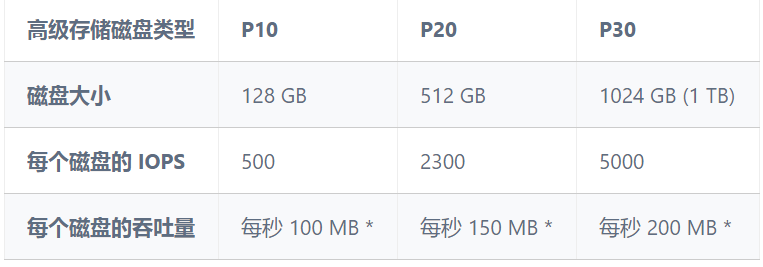使用 fio 工具对 Azure 存储进行 IOPS 测试
fio 是用来测试磁盘 IOPS 的工具,具有安装简单,测试方法灵活、方便的特点。 本例,我将使用 fio 对 Azure 高级存储磁盘进行 IOPS 测试。
测试环境:
[root@DS13IOTEST ~]# cat /etc/redhat-release
CentOS release 6.5 (Final)
[root@DS13IOTEST ~]# uname -a
Linux DS13IOTEST 2.6.32-431.29.2.el6.x86_64 #1 SMP Tue Sep 9 21:36:05 UTC 2014 x86_64 x86_64 x86_64 GNU/Linux
[root@DS13IOTEST ~]# fio --version
fio-2.1.10
[root@DS13IOTEST ~]# modinfo hv_vmbus
filename: /lib/modules/2.6.32-431.29.2.el6.x86_64/weak-updates/microsoft-hyper-v/hv_vmbus.ko
version: 4.1.2
license: GPL
srcversion: 82B9AE7A2B6BFE26B1AC6A4
alias: acpi*:VMBus:*
alias: acpi*:VMBUS:*
depends:
vermagic: 2.6.32-431.el6.x86_64 SMP mod_unload modversions
[root@DS13IOTEST ~]# df -T
Filesystem Type 1K-blocks Used Available Use% Mounted on
/dev/sda1 ext4 30962684 2745376 26644496 10% /
tmpfs tmpfs 28913628 0 28913628 0% /dev/shm
/dev/sdb1 ext4 115596768 192120 109532680 1% /mnt/resource
/dev/sdc1 ext4 528444416 202520 501398488 1% /datadrive512G
/dev/sdd1 ext4 1055860904 204056 1002022244 1% /datadrive1023G
测试脚本下载:https://azuresupport.blob.core.windows.net/linux/fio.sh.tar.gz
根据 Azure 高级存储磁盘的说明,当前 Azure 共有三种高级存储:P10, P20, P30。 这三者是怎么区分的呢? 实际上,Azure 根据磁盘的大小来划分该磁盘所属的性能类型。
高级存储磁盘性能类型如下:

我们知道,通过 Portal 来添加高级存储磁盘, 其大小一般只有三种:128GB,512GB,1023GB。但如果我们通过命令的方式来添加磁盘,则磁盘大小是可以任意的(不超过当前最大的 1T 限制)。那么,当用户添加了一块 129G 的高级存储磁盘,其性能是属于 P10,还是 P20 呢?原来,Azure 在划分高级存储磁盘所属的性能类型时,采用的是向上舍入 (round up) 的方式。这样 10GB 的磁盘,其性能指标属于 P10, 129GB 的磁盘,其性能指标属于 P20,1000GB 的磁盘其性能指标属于 P30
以下是使用测试脚本对 P20, P30 及 Raid0 所做的 IOPS 测试
P20 测试:
[root@DS13IOTEST ~]# ./fio.sh /datadrive512G >p20_fio_report
[root@DS13IOTEST ~]# cat p20_fio_report | grep -i iops
write: io=282164KB, bw=9385.8KB/s, iops=2346, runt= 30063msec
write: io=281960KB, bw=9382.1KB/s, iops=2345, runt= 30053msec
write: io=281804KB, bw=9377.9KB/s, iops=2344, runt= 30050msec
read : io=141200KB, bw=4691.7KB/s, iops=1172, runt= 30096msec
write: io=141248KB, bw=4693.3KB/s, iops=1173, runt= 30096msec
read : io=141196KB, bw=4692.4KB/s, iops=1173, runt= 30091msec
write: io=141248KB, bw=4694.3KB/s, iops=1173, runt= 30091msec
read : io=141200KB, bw=4692.2KB/s, iops=1173, runt= 30093msec
write: io=141248KB, bw=4693.8KB/s, iops=1173, runt= 30093msec
p30 测试:
[root@DS13IOTEST ~]# ./fio.sh /datadrive1023G >p30_fio_report
[root@DS13IOTEST ~]# cat p30_fio_report | grep -i iops
write: io=524288KB, bw=20405KB/s, iops=5101, runt= 25694msec
write: io=524288KB, bw=20399KB/s, iops=5099, runt= 25702msec
write: io=524288KB, bw=20394KB/s, iops=5098, runt= 25708msec
read : io=262544KB, bw=10222KB/s, iops=2555, runt= 25685msec
write: io=261744KB, bw=10191KB/s, iops=2547, runt= 25685msec
read : io=262544KB, bw=10223KB/s, iops=2555, runt= 25682msec
write: io=261744KB, bw=10192KB/s, iops=2547, runt= 25682msec
read : io=262544KB, bw=10224KB/s, iops=2556, runt= 25678msec
write: io=261744KB, bw=10193KB/s, iops=2548, runt= 25678msec
新增两块盘 sde(512G),sdf(1023G) 做 raid 0 测试:
[root@DS13IOTEST ~]# yum -y install mdadm
[root@DS13IOTEST ~]# mdadm --create /dev/md512 --level 0 --raid-devices 2 /dev/sdc1 /dev/sde1
[root@DS13IOTEST ~]# mdadm --create /dev/md1023 --level 0 --raid-devices 2 /dev/sdd1 /dev/sdf1
[root@DS13IOTEST /]# mount -O barrier=0 /dev/md512 /raid0_datadrive512G
[root@DS13IOTEST ~]# ./fio.sh /raid0_datadrive512G > raid0_p20_fio_report
[root@DS13IOTEST ~]# cat raid0_p20_fio_report | grep -i iops
write: io=524288KB, bw=18665KB/s, iops=4666, runt= 28090msec
write: io=524288KB, bw=18635KB/s, iops=4658, runt= 28134msec
write: io=524288KB, bw=18669KB/s, iops=4667, runt= 28084msec
read : io=262544KB, bw=9345.9KB/s, iops=2336, runt= 28092msec
write: io=261744KB, bw=9317.4KB/s, iops=2329, runt= 28092msec
read : io=262544KB, bw=9349.2KB/s, iops=2337, runt= 28082msec
write: io=261744KB, bw=9320.8KB/s, iops=2330, runt= 28082msec
read : io=262544KB, bw=9349.9KB/s, iops=2337, runt= 28080msec
write: io=261744KB, bw=9321.4KB/s, iops=2330, runt= 28080msec
[root@DS13IOTEST /]# mount -O barrier=0 /dev/md1023 /raid0_datadrive1023G
[root@DS13IOTEST ~]# ./fio.sh /raid0_datadrive1023G > raid0_p30_fio_report
[root@DS13IOTEST ~]# cat raid0_p30_fio_report | grep -i iops
write: io=524288KB, bw=40683KB/s, iops=10170, runt= 12887msec
write: io=524288KB, bw=40624KB/s, iops=10155, runt= 12906msec
write: io=524288KB, bw=40709KB/s, iops=10177, runt= 12879msec
read : io=262544KB, bw=20363KB/s, iops=5090, runt= 12893msec
write: io=261744KB, bw=20301KB/s, iops=5075, runt= 12893msec
read : io=262544KB, bw=20366KB/s, iops=5091, runt= 12891msec
write: io=261744KB, bw=20304KB/s, iops=5076, runt= 12891msec
read : io=262544KB, bw=20368KB/s, iops=5092, runt= 12890msec
write: io=261744KB, bw=20306KB/s, iops=5076, runt= 12890msec
[root@DS13IOTEST ~]#
综上,我们可以得出以下结论:p20, p30 的高级存储 iops 测试符合磁盘的 iops 性能预期。